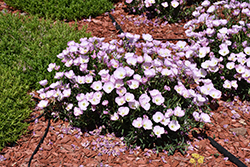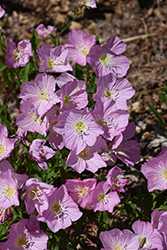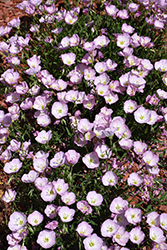It's all about ...
plants

Twilight Evening Primrose
Oenothera berlandieri 'Turner01'
Height: 12 inches
Spacing: 30 inches
Sunlight:
![]()
Hardiness Zone: 5a
Other Names: Oenothera speciosa var. berlandieri
Description:
An excellent variety with deep plum new growth that progresses to green; a prolific display of large, long lasting pale pink flowers all season; cold and drought tolerant once established
Ornamental Features
Twilight Evening Primrose has masses of beautiful lightly-scented shell pink cup-shaped flowers with yellow eyes along the stems from late spring to early fall, which are most effective when planted in groupings. Its narrow leaves emerge plum purple in spring, turning green in colour with showy plum purple variegation throughout the season.
Landscape Attributes
Twilight Evening Primrose is an herbaceous perennial with a ground-hugging habit of growth. Its medium texture blends into the garden, but can always be balanced by a couple of finer or coarser plants for an effective composition.
This is a high maintenance plant that will require regular care and upkeep, and is best cleaned up in early spring before it resumes active growth for the season. Gardeners should be aware of the following characteristic(s) that may warrant special consideration;
- Spreading
Twilight Evening Primrose is recommended for the following landscape applications;
- Mass Planting
- Border Edging
- General Garden Use
- Groundcover
- Naturalizing And Woodland Gardens
Planting & Growing
Twilight Evening Primrose will grow to be about 12 inches tall at maturity, with a spread of 3 feet. When grown in masses or used as a bedding plant, individual plants should be spaced approximately 30 inches apart. Its foliage tends to remain dense right to the ground, not requiring facer plants in front. It grows at a fast rate, and under ideal conditions can be expected to live for approximately 10 years. As an herbaceous perennial, this plant will usually die back to the crown each winter, and will regrow from the base each spring. Be careful not to disturb the crown in late winter when it may not be readily seen!
This plant should only be grown in full sunlight. It prefers dry to average moisture levels with very well-drained soil, and will often die in standing water. It is considered to be drought-tolerant, and thus makes an ideal choice for a low-water garden or xeriscape application. It is not particular as to soil type or pH. It is somewhat tolerant of urban pollution. This is a selection of a native North American species. It can be propagated by division; however, as a cultivated variety, be aware that it may be subject to certain restrictions or prohibitions on propagation.
This plant is not reliably hardy in our region, and certain restrictions may apply; contact the store for more information.


